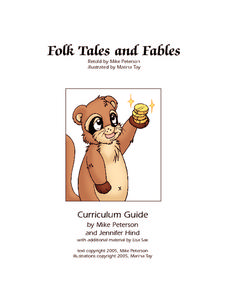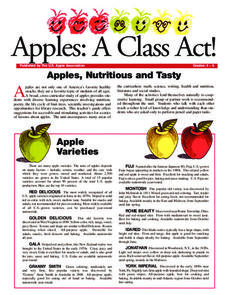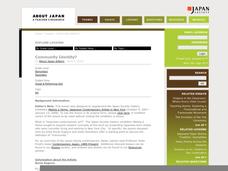Weekly Story Book
Folk Tales and Fables
Pages and pages of engaging activities, worksheets, and writing projects on teaching folktales and fables await you! You don't want to miss this incredible resource that not only includes a wide range of topics and graphic...
Gobal Oneness Project
Passionate Pursuits
Not all technology is digital. Teach learners about the low-tech maker movement with a photo essay about six artisans from California and two articles about the local creator movement. After tackling the photo essay in small...
US Apple Association
Apples: A Class Act! (Grades 4–6)
Middle schoolers have a bushel of fun as they engage in activities and research core facts about apples. Packed with suggestions for in-class activities and out-of-class research, the colorful 6-page packet is sure to satisfy hungry...
Smithsonian Institution
Mobilizing Children
Scholars find out how the government used propaganda to mobilize children to help in the war effort. Lesson exercises include analyzing a quote from Franklin Roosevelt, viewing propaganda images and posters, and participating in a lively...
Curated OER
Cloze Passage: Lim Bo Seng
Use this Cloze activity worksheet in your vocabulary lesson or unit about World War II. After reading a passage about Lim Bo Seng, a guerrilla warrior from Singapore, sixth graders fill in twelve blank spaces using context clues. The...
Curated OER
What's In a Name?
Students explore the relationship between names and certain cultures and locations. In this identity activity, students create family migration or immigration maps. Students read excerpts from When My Name was Keoko and Lost Names:...
K12 Reader
What's the Purpose? FDR's Pearl Harbor Speech
FDR's December 7, 1941 address to the nation is the focus of a reading comprehension exercise that asks middle schoolers to read an excerpt from the Pearl Harbor speech and determine the president's purpose.
Balanced Assessment
The Triskaidecaphobia Conference
Triskaidecaphobia is an extreme superstition to the number 13—and ironically the answer to the word problem is 13! Presented with a series of descriptive data, individuals analyze the data to determine the population size. They...
Curated OER
Victory in the Pacific, 1943-1945
Students examine the military campaigns of the Pacific theater, tracing the path of the Allied offensives. The lesson presents what the Allies were trying to accomplish and why.
Curated OER
American Becomes a Colonial Power
Exploring the idea of America joining "the imperialist club" at the end of the 19th century, this presentation presents reasons why America not only had the drive to explore the world, but the power and wealth with which to do so....
Curated OER
American Foreign Policy: 1920 - 1941
Take your class through the period between World War I and World War II. Covering various treaties and pacts between America and its neighbors - namely, Japan, Germany, and the Soviet Union- these slides could inspire some political...
Curated OER
Hiroshima and Nagasaki: Still Teaching Lessons To This Generation
Discuss Laurence Yep's novella, Hiroshima, to inspire future historical fiction writers.
Curated OER
Shizuko's Daughter: Concept of Definition Word Map
Help your class use critical thinking when it comes to unfamiliar words. With vocabulary from Kyoko Mori's Shizuko's Daughter, kids write the word in the center of a graphic organizer, and find its category, comparisons,...
Asian Art Museum
Community Identity?
To better understand the contemporary arts movement in Japan, learners engage in a guided discussion. They view several photograms by the artist Kunie Sugirua, then discuss the elements of art and techniques used to create each...
Student Handouts
A Society in Transition
Cover the 1980s in your class with a brief informational text and seven related questions. The one-page reading passage includes general information about jobs and skills, population patterns, and the AIDS epidemic.
Polk County Public Schools
The Blame Game for the Loss at Pearl Harbor
Known as the day that will live in infamy, the attack on Pearl Harbor in 1941 was a shock to all. But why was the United States unprepared on that December morning? Study a series of primary sources in a document-based question that...
Curated OER
Be the Poet
Students work through a Haiku Organizer to determine the characteristics they use to write eight haiku poems on a theme that they choose. They design presentation folders of their completed work.
National Endowment for the Humanities
The New Order for "Greater East Asia"
Sometimes the New Order becomes synonymous with its implications for European countries, but what about its consequences for East Asia? The final instructional activity in a four-part series teaches scholars about World War II. High...
Curated OER
Coming of Age Readings: Experiences in Korea and by Asians in America
Bring multi-cultural experiences and literature into your language arts class with this lesson plan. Here, young readers explore the points of view of first and second-generation Asian immigrants with a list of various fiction and...
Education World
Every Day Edit - Hiroshima Bombing
In this everyday editing worksheet, students correct grammatical mistakes in a short paragraph about the Hiroshima bombing. The errors range from punctuation, spelling, grammar, and capitalization.
Curated OER
Wild Swans Reader's Guide
While reading Wild Swans by Jung Chang, guide your scholars with these questions. Twenty-nine questions challenge their comprehension, which they use to create a double-entry journal for marking down important quotes and their relevance...
Curated OER
Why do wars occur?
Understanding the causes of war is one way (possibly) to prevent it. World War II is used as a case study to facilitate an understanding of reasons why wars start. Topics covered included Totalitarianism, scarcity of resources, need for...
Curated OER
Many Advantages of a Lesson Study
Collaborating with colleagues on the lesson-study process can enrich various areas of education.
Japan Society
Nature and the Environment in Postwar Japan
Japan has a complex relationship with the environment. Explore this relationship with your class through this resource. Included are thought questions, several activity ideas that range from writing, to discussion, to research, and an...
Other popular searches
- Japanese Film
- Japanese Art and Music
- Japanese Culture
- Japanese Internment
- Japanese Art
- Japanese Internment Camps
- Japanese Folk Tales
- Japanese Literature
- Japanese Cooking
- Japanese Calligraphy
- Japanese Poetry
- Japanese Americans

























